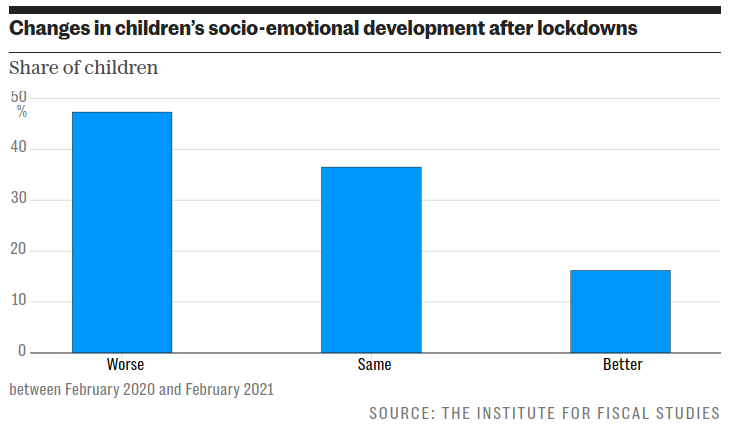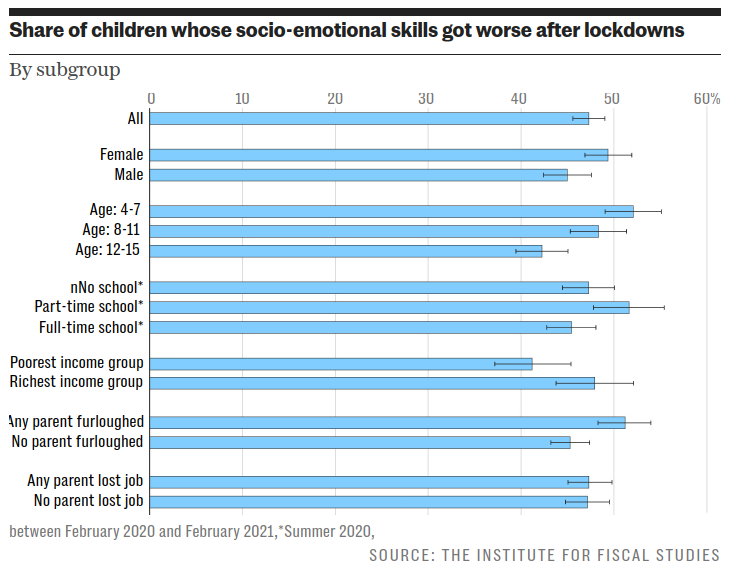Lockdown ‘harmed emotional development of almost half of children’
Youngsters became more prone to low moods and loss of confidence following restrictions, study shows
Lockdown damaged the emotional development of almost half of children, a major study has shown.
Parents said their children appeared more worried, had lost confidence more easily and were more prone to tantrums and low moods after the UK’s Covid lockdowns.
The findings emerged in the first study of its kind into the impact of lockdowns on children’s behaviour and emotional development, with the Institute for Fiscal Studies (IFS) and the UCL Institute of Education surveying more than 6,000 parents in England.
Just under half of parents said they believed their child’s social and emotional skills had worsened during the first year of the pandemic, revealing that the impact of lockdowns has extended beyond lost academic progress.

It comes as separate research, published on Tuesday, showed that eating disorders among children have doubled in the last six years, which Dame Rachel de Souza, the Children’s Commissioner for England, told The Telegraph may have been fuelled by children spending more time online during lockdowns.
Around 11,800 people under the age of 18 began treatment on the NHS for eating disorders in 2022-23, up from 5,240 in 2016-17.
Dame Rachel, who analysed the figures, warned that children needed to be “robustly protected” from harmful online content, to which they may have become more exposed in isolation during lockdowns.
Commenting on the research from UCL and the IFS, she said: “This study shows that the disruption the pandemic caused to children’s development has been long-lasting. It is vital that the right social and emotional support is made available to allow children the chance to recover and go on to achieve all that they want to.”
Dame Rachel said she was extremely concerned about the rise in the number of children needing treatment for eating disorders, adding: “As we come out of the shadow of the pandemic, the extent of the crisis in children’s mental health is becoming more and more evident.
“I worry that the isolation many children faced during the lockdowns not only led to children being cut off from support networks and vital health services, but also to spending more time online.”
The Telegraph has reported extensively on the impact of lockdowns and school closures on children.
The IFS and UCL study found that job insecurity among parents during lockdowns, including those placed on furlough, had a negative impact on children’s social and emotional development.

It is the latest evidence of the severe impact of the Covid lockdowns, including their economic consequences, on a generation of children.
Government data show that persistent absence from school has doubled since the pandemic, with 1.7 million pupils now missing at least 10 per cent of school time.
The number of pupils who miss 50 per cent of lessons has doubled, with 125,000 now skipping most of their schooling, which ministers have been warned could cause a surge in youth crime.
Education leaders are also worried about the impact of lockdowns on this year’s exam cohorts, warning that teenagers in England who missed sitting their GCSEs have been set up for a harsh reality check when they receive their A-level results in August and become the first Covid cohort to experience a return to pre-pandemic grading standards.
Anne Longfield, who served as children’s commissioner during the Covid crisis, said: “The impact of the pandemic on the well-being and development of many of our children is extremely alarming.
“I am not convinced though that the Government fully grasps the scale of the problem or the long-term consequences for our society and economy.”
The IFS and UCL surveyed 6,095 parents living in England whose children were aged between four and 16 in February 2021, at the tail end of England’s third national lockdown and second period of national school closures.
The researchers asked parents 13 questions about their children’s behaviours, including how often their child appeared worried, lost confidence easily or had tantrums, both in February 2021 and, retrospectively, a year earlier.
They found that 47 per cent of parents believed their child’s social and emotional skills had worsened during the first year of the pandemic. In contrast, just one in six children saw their social and emotional development improve over this period.
Fifty-two per cent of children aged four to seven were reported to have seen their social and emotional development deteriorate, compared with 42 per cent of 12 to 15-year-olds.
Previous studies have focused on children’s loss of learning during the pandemic, with those from disadvantaged backgrounds falling further behind their middle-class peers.
However, the IFS study found no evidence that children from poorer families suffered any worse impact on their social and emotional skills than their wealthier peers.
Andrew McKendrick, a research economist at the IFS and an author of the report, said: “Disruption in itself was bad for children, whether their parents were going in or out of furlough, or in and out of employment.
“The startling thing is that households where parents continued to be unemployed throughout the entire year don’t seem worse off in terms of their children’s social and emotional development, compared to children with parents who were employed for the entire time.
“There’s been some discourse suggesting that children will bounce back and this has not been long-lasting. Wider evidence outside our study has shown that this kind of disruption to children can have long-lasting consequences. We are seeing these impacts at present in children and mental health referrals are higher than before the pandemic.”
Josh Hillman, the director of education at the Nuffield Foundation, which funded the study, said: “This important research highlights yet another adverse and compounding effect the pandemic had on children and young people, particularly those whose parents stopped working or were furloughed.
“Children’s social and emotional development is important, not only in its own right but also in supporting their capacity to learn and achieve in school, which in turn can bolster their longer-term outcomes.”
A government spokesperson said: “We know children were amongst those most affected by the pandemic and we are committed to helping them catch up academically as well as socially and in terms of emotional wellbeing.
“All pupils are taught about mental wellbeing as part of relationships, sex and health education, and we’re investing an additional £2.3 billion a year in NHS mental health services by March 2024.
“We’re also boosting capacity at children and young people’s community eating disorder services, helping them to treat nearly 50 per cent more young people in 2022/23 than 2019/20.”